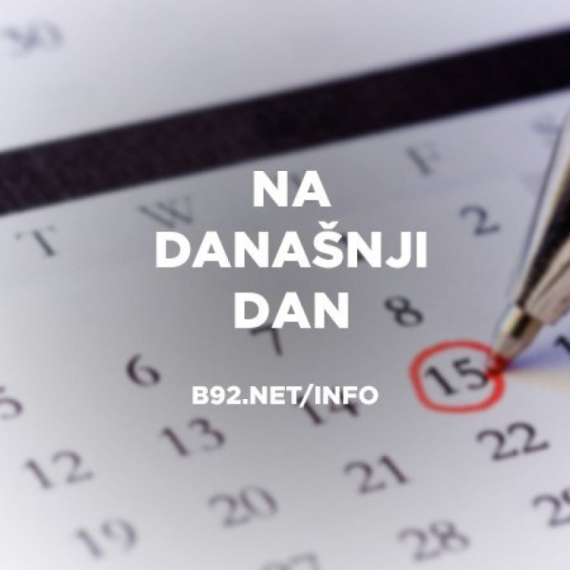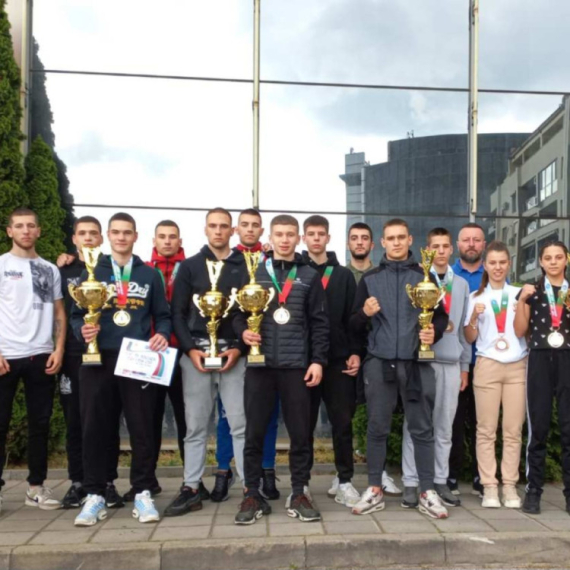Trilateral summit sparks opposing reactions
The conclusions from trilateral summit between Serbia, Bosnia-Herzegovina and Turkey have sparked different reactions.
Wednesday, 27.04.2011.
11:52

The conclusions from trilateral summit between Serbia, Bosnia-Herzegovina and Turkey have sparked different reactions. Republic of Srpska (RS) President Milorad Dodik was not particularly impressed with the meeting, while Islamic Community in Serbia Chief Mufti Muamer Zukorlic was satisfied. Trilateral summit sparks opposing reactions Serbian and Turkish Presidents Boris Tadic and Abdullah Gul and members of the Bosnia-Herzegovina Presidency Nebojsa Radmanovic, Zeljko Komsic and Bakir Izetbegovic agree that the three countries support each other on the EU integration path, but that they will not interfere with each other's internal issues. “We have to act together in the fight against prejudice that originated from our difficult history because if we leave room for prejudice, we will come to face numerous problems in the future,” Tadic said. Dodik, however, is not impressed with the summit. He believes that the summit at Karadjordjevo was a protocol one, but that “a degree of suspicion” was introduced by Turkey’s role, which wishes to support only one side in Bosnia - Bosniaks (Muslims), agencies reported. “Turkey is now entering a higher phase, and this is to, by supporting one side with its policy of favoritism, gain support on the regional level”, Dodik said. He added that he was not especially impressed with the summit, but that he believed such meetings were good forms of communication and that they should contain more discussions on economic cooperation. “We saw that in Sarajevo there had been some preparations as if some kind of declarations or resolutions were to be brought at that meeting, but we have also seen that nothing has come of the Istanbul Resolution,“ the RS President pointed out. Last spring, the leaders of the three countries signed the Istanbul Declaration in which they expressed the standpoint that regional policy should in the future be based on ensuring security, a constant political dialogue and preservation of multiethnic, multicultural and multi-religious traits of the region. Izetbegovic argued that the disintegration in the Balkans was over and that now the only remaining thing was integration. “The disintegration in the Balkans belongs to the past, and now only integration remains, and within this integration Sandzak might become a European region with the opportunity for cooperation with all other regions in Serbia and outside Serbia,“ he stressed, underscoring that that was the real way out for Sandzak. Zukorlic responded positively to the Karadjordjevo summit, saying that it would contribute towards easing tensions in the region. However, the mufti repeated his standpoint of favouring Sandzak’s autonomy and that he believed this to be a constitutive part of integration processes. “I believe it is a good thing that this meeting took place. It certainly represents a kind of step forward in future relations between countries, we shall see how big, but certainly positive”, he said. The meeting in Karadjordjevo was also covered by the world news agencies. AFP pointed out Gul's statement that Turkey wanted to help the Balkans become a stable region on the EU and NATO integration path. The AP has assessed that the Turkish diplomatic initiative illustrates Istanbul's wish to renew its influence in the Balkans. Boris Tadic and Abdullah Gul (Beta)
Trilateral summit sparks opposing reactions
Serbian and Turkish Presidents Boris Tadić and Abdullah Gul and members of the Bosnia-Herzegovina Presidency Nebojša Radmanović, Željko Komšić and Bakir Izetbegović agree that the three countries support each other on the EU integration path, but that they will not interfere with each other's internal issues.“We have to act together in the fight against prejudice that originated from our difficult history because if we leave room for prejudice, we will come to face numerous problems in the future,” Tadić said.
Dodik, however, is not impressed with the summit. He believes that the summit at Karađorđevo was a protocol one, but that “a degree of suspicion” was introduced by Turkey’s role, which wishes to support only one side in Bosnia - Bosniaks (Muslims), agencies reported.
“Turkey is now entering a higher phase, and this is to, by supporting one side with its policy of favoritism, gain support on the regional level”, Dodik said.
He added that he was not especially impressed with the summit, but that he believed such meetings were good forms of communication and that they should contain more discussions on economic cooperation.
“We saw that in Sarajevo there had been some preparations as if some kind of declarations or resolutions were to be brought at that meeting, but we have also seen that nothing has come of the Istanbul Resolution,“ the RS President pointed out.
Last spring, the leaders of the three countries signed the Istanbul Declaration in which they expressed the standpoint that regional policy should in the future be based on ensuring security, a constant political dialogue and preservation of multiethnic, multicultural and multi-religious traits of the region.
Izetbegović argued that the disintegration in the Balkans was over and that now the only remaining thing was integration.
“The disintegration in the Balkans belongs to the past, and now only integration remains, and within this integration Sandžak might become a European region with the opportunity for cooperation with all other regions in Serbia and outside Serbia,“ he stressed, underscoring that that was the real way out for Sandžak.
Zukorlić responded positively to the Karađorđevo summit, saying that it would contribute towards easing tensions in the region.
However, the mufti repeated his standpoint of favouring Sandžak’s autonomy and that he believed this to be a constitutive part of integration processes.
“I believe it is a good thing that this meeting took place. It certainly represents a kind of step forward in future relations between countries, we shall see how big, but certainly positive”, he said.
The meeting in Karađorđevo was also covered by the world news agencies. AFP pointed out Gul's statement that Turkey wanted to help the Balkans become a stable region on the EU and NATO integration path. The AP has assessed that the Turkish diplomatic initiative illustrates Istanbul's wish to renew its influence in the Balkans.





















Komentari 2
Pogledaj komentare